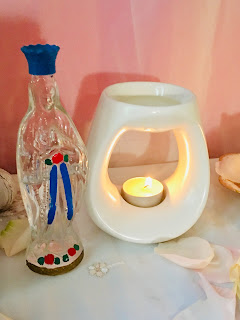Blessings to you on Day Six of Walking with Mary
Today you can add an oil burner to your altar and
burn lemon oil. I like to add water to my oil in the
burner and some people add salt.
Later on in the practise I will share with you a powerful
meditation blend of the other two oils listed previously.
You can continue to burn lemon oil every day.
It is also a good practise to burn lemon oil throughout your
house and even to add lemon oil to a water spray bottle,
add holy or blessed water as well, and spritz in the rooms.
A few years ago I became obsessed with both the smell and taste
of lemons. I started with drinking lemon in my water, burning lemon oil,
wearing lemon oil and eventually I travelled to the south of Italy
to immerse myself in the culture and traditions related to the use of lemons.
Since then I have uncovered so much research on this sacred fruit!
The lemon is a citrus which is a variegation of the Etrog, also known as
Citron and Citron Medica. I am sharing the following from the website
that I share below.
The etrog originated in India. From there it found its way
to Persia
(modern-day Iran), Aram-Naharayim (modern-day northern Syria),
Israel
and Egypt. Archaeologists have discovered etrog seeds in
Iraq (ancient Babylon)
dating back to 4000 BCE, and etrogs
were found in Egyptian tombs and wall
murals dating to 1500 BCE.
We can learn about the antiquity of the etrog
from Jewish
sources. According to one tradition, the “Tree of Knowledge” i
n the Garden of
Eden was an etrog tree. One basis for this tradition is the
biblical
description: “and the woman (Eve) saw that the tree was good for eating
and a
pleasure to look upon” (Genesis 3:6).
In the Midrash, the Sages taught that one
of the distinguishing features
of the earliest trees was that all of their
parts were edible.
“Go and see which tree …can be eaten just as its fruit.
You
will only find the etrog” (Breishit Rabba 15, 8). In the time
of the Mishna and
the Talmud, it was customary to eat the sprouts
and the young leaves of the
etrog tree.
It is still customary in the Jewish tradition to gift others with
and etrog or citrus on the religious feast day of Sukkot.
In Italian folklore and herbal craft and tradition, it is a practise
to plant a lemon tree at your front door for protection.
It is also still a practise in some areas to keep a branch
from a lemon tree in your kitchen, as well as a bowl of the fruit.
At many hotels and guesthouses you will still see a bowl of lemons
at the front door - for purification and protection!
At the feast of the Madonna in Tropea entire
bouquets were created from lemons and her statue
had lemon trees on either side.
 |
| a wreath that I created from lemons and oranges |






No comments:
Post a Comment